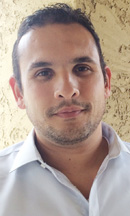João Chaves: Lessons from Hispanic Baptists in Texas
Preface from Baptist University of the Américas President René Maciel: The Baptist University of the Américas exists to train and prepare Hispanic church leaders to, in turn, grow Hispanic Baptist church work. Our connection to Convención Bautista Hispana de Texas goes back to the beginning. Many Hispanic Baptist churches have supported and cared for our school and our students over many years. The Hispanic convention continues to pray, care for and support us as we still train more Hispanic Baptist church ministers than the eight other Texas Baptist universities combined. The majority of our students come from Texas Baptist Hispanic congregations, although many enroll from other states and countries. One of those is João Chaves, whose thoughts appear in this column. Thank you, Convención, for encouraging and supporting BUA nearly 70 years.
I became Latino when I exited the plane in Miami, Fla. Before then, I was just a Brazilian, and one who enjoyed the pleasure of identifying with a somewhat privileged sector of Brazilian society. If anyone had asked me what “race” I was, I would have—after quickly recovering from the shock of being asked such a strange question—reluctantly answered “white.”
 João ChavesIt was only after my involuntary and unexpected metamorphosis from Brazilian to Latino that I began my journey toward acknowledgement of the importance of place. From the vantage point of my recently inherited minority status, I noticed the profound ways in which social contexts influenced knowledge claims—how characteristics such as race, nationality, gender, education and income have a bearing on the way reality is imagined.
João ChavesIt was only after my involuntary and unexpected metamorphosis from Brazilian to Latino that I began my journey toward acknowledgement of the importance of place. From the vantage point of my recently inherited minority status, I noticed the profound ways in which social contexts influenced knowledge claims—how characteristics such as race, nationality, gender, education and income have a bearing on the way reality is imagined.
Only after I enrolled in the Baptist University of the Américas in San Antonio was I able to learn how, given my realization of the importance of place, I could engage the Latina/o community of which I became a part in fruitful, thoughtful and effective ways. My time at BUA was challenging and special, and the more I look back at what I learned there, the more I realize how much I was impacted by the BUA experience.
I remember, for instance, my post-BUA experience in seminary, when people tried to talk about diversity and global perspectives, and I had come from a place where some of my classes included people from 13 countries—from Europe, Asia, Africa and the Américas. It was only then, in seminary, I finally fully realized the depth of BUA’s mission: “The formation, from the Hispanic context, of cross-cultural Christian leaders.”
Education comes from a place
The first deep recognition in this statement is the unusual and even odd recognition that education comes from a place—a socio-cultural environment heavily informs the way in which the educational event happens. Education always comes from a place, from a context, but if one looks at the mission statements of institutions of higher education around this nation, one hardly will find this recognition.
But this word in BUA’s statement—“from”—is a word whose power became clearer than ever to me in seminary, when I encountered many seminarians who wanted to speak from nowhere, as if they had a monopoly on truth rather than a perspective. The “good, the true and the beautiful” are things we need to strive for. But in our globalized, pluralized society, the search for truth must begin with the acknowledgement we come from a place; we speak from somewhere.
So paradoxically, BUA’s mission to form students “from the Hispanic context” is precisely the recognition that opens space for authentic appreciation of insights coming from other contexts. This recognition, that education comes “from” somewhere, helped me navigate the difficulties of dealing with people who act as if they came from nowhere.
BUA helped
The cross-cultural education at BUA does not begin, in principle, with a disposition toward conformity, but it begins with the acknowledgement of place. This is extremely helpful and more unusual than it should be. BUA helped and still helps current and former students and me navigate the politics of difference in a pluralized and flat world in which difference is increasingly becoming the norm.
 As I look in retrospect to my experience at BUA and in prospect to whatever God has for me, I am thankful for BUA and for how it helped me and many others make sense of life “from” somewhere.
As I look in retrospect to my experience at BUA and in prospect to whatever God has for me, I am thankful for BUA and for how it helped me and many others make sense of life “from” somewhere.
João Chaves is a graduate of Baptist University of the Américas and Baylor University’s Truett Seminary. He teaches as an adjunct for BUA while pursuing a doctor of philosophy in religion degree at Baylor.